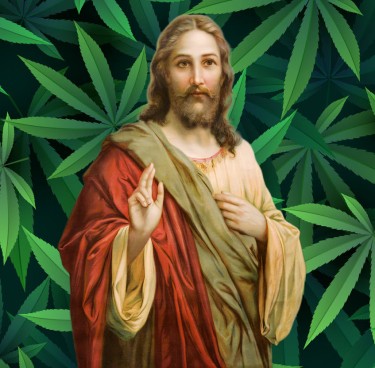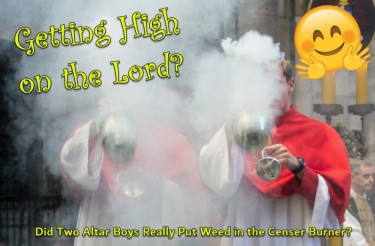
Reginald vs. the Arch Bishop
Recently, I came across a pastoral letter penned by Archbishop Aquila of Colorado addressing his concerns around cannabis legalization and use. Written like an epistle to fellow Catholics, it aimed to sway opinions against the licensed cannabis industry.
As a long-time cannabis advocate, I felt compelled to respond in a similar literary fashion – as one man of the “hempen cloth” respectfully engaging another man of the “holy cloth.”
While our perspectives differ, perhaps this exchange in good faith can further mutual understanding on this complex issue from both moral and pragmatic lenses. The Bible does talk about cannabis, and it is not in a negative way at all!
Therefore, I’ve written my own epistle responding to the Archbishop’s major points from my own experience and reason. Let’s see what insights emerge from juxtaposing these alternating angles.
Now onward to my open letter rebutting the claims around legal cannabis dangers to society’s moral fabric and human dignity. As with all exploration of truth, there are always new depths to fathom through candid dialogue.
Dear Reasonable Readers,
It seems the esteemed Archbishop fancies himself the great savior sent to rescue the misguided masses from our wanton embrace of the devil’s lettuce. As a long-tenured voice for cannabis wisdom, I feel duty-bound to put nib to parchment addressing this woefully regressive scribing.
While I applaud any attempt at intelligent discourse, imposing one’s personal prohibitions under pretense of salving imaginary moral failings benefits nobody. Individual experience, not institutional dogma, should guide adult choices around cannabis and entheogens.
As a man of the (hemp) cloth myself, I speak for the reasoned liberty to explore consciousness on our own terms, according to inner authority. No earthly gatekeeper can govern the landscape of spirit.
The dear Archbishop surely means well in his paternalistic intentions, as misguided as they may be. But his desire to rescue reflects an antiquated worldview clinging to control as progress leaves it behind.
Therefore I will unravel his arguments with care, humility and wit – addressing notions of “public danger” in hopes of uplifting understanding between all people of compassion.
While our perspectives may differ, we share the highest aim of reducing suffering through wisdom. Surely some common ground exists sans condemnation of those finding solace or insight through this sacred plant’s gifts.
But first, a light roast and fresh bowl beckon to set the stage. Prepared thusly in body and mind, let us delve in…
One is not the other
A core mistake permeating the Archbishop’s thesis is conflating all “drugs” – from cannabis to fentanyl – invoking one to indict the other. But equating these substances betrays a superficial analysis, ignoring profound pharmacological differences.
Cannabis legalization has never been linked to increased opioid deaths. In fact, extensive data reveals the opposite – medical marijuana availability correlates to reduced opioid abuse and mortality.
The reason is simple – cannabis provides a safe alternative for pain relief with no lethal dosage, avoiding the addictive spiral of dangerous pharmaceuticals. Patients rationally substitute lower-risk cannabis for toxic prescription opioids.
So the proliferation of deadly synthetics like fentanyl is a crisis fueled by overzealous medical and recreational regulation, not legal plant access. Prohibition’s squeeze effect drives addicts toward ever more dangerous black market alternatives once cut off from legal channels.
If the dear Archbishop truly wishes to reduce opioid deaths, he would support fully decriminalizing possession for personal use to break cartel monopolies. Adults could access regulated supplies without life-crushing criminal penalties or impure street substitutes.
This public health approach understands you cannot temper human nature through moralizing and force. Only by meeting people where they are, with pragmatism and compassion, can positive change occur.
Demonizing safe, useful plants that never caused an overdose death makes little sense beside truly hazardous synthetics killing tens of thousands annually. Conflating them suggests reactionary reasoning rather than empirical cost-benefit analysis.
Moreover, traces of fentanyl in seemingly any street substance make blanket prohibition even deadlier in the age of mass poisoning. Preaching total abstinence amidst this crisis ignores on-the-ground reality.
While addiction is heartbreaking, we only compound the despair through judgment and incarceration. The divine light shines in each person intrinsically beyond circumstances. How much suffering has the Church inflicted through moral certitude?
Cannabis, meanwhile, presents no comparable public safety risk and offers profound mind-body benefits tempering addictive drives when used consciously. Where is the crime against human dignity in this healing ally?
I understand the Archbishop aims for moral clarity with easy categorical bans. But such reasoning collapses upon examination. We must drop fear-based ideologies to actually serve humankind’s welfare.
The essence is recognizing humanity’s agency with compassion, not exerting institutional control. Otherwise the Church joins the oppressors, forcing conformity that breeds resentment and rebellion.
If contradiction and hypocrisy undermine moral authority, what does logic say about incarcerating non-violent neighbors for using a non-lethal plant? Or blessing wine each Mass as holy while condemning far safer substances?
I ask only for philosophical consistency aligned with Christ’s teachings of unconditional love and forgiveness. If brewed beverages warrant no prohibition, how can anyone justify jailing adults for cannabis under a just God? What if Jesus told his followers to legalize the cannabis plant? Would Catholics rally and push politicians from the Right to do God’s Will?
The Free Will Argument
A contradiction arises when moral authorities condemn adults exercising free choice granted by God. Nowhere in scripture does Jesus model coercive prohibition against benign freedoms. So what precedent allows institutional power to override divine gifts?
The essence of Christianity centers on recognizing God’s supreme respect for human free will. Despite foreknowledge of sin and suffering, He trusts us with moral autonomy.
This begins in Eden’s garden. God implores guidance, not restriction – warning Adam and Eve to avoid forbidden fruit, yet allowing choice. He understands coercive control cannot cultivate growth.
Thus, we inherit the Creator’s image imprinted with intrinsic freedom of will. Every soul journeys toward salvation at its own pace through experiencing consequences. Spiritual maturity arises from difficult discernment, not blind obedience.
Outlawing choice attempts to undermine God’s trust in us to learn and grow wise. But forbidden fruit becomes most tempting, as the Archbishop knows. What purpose does banning plants serve except inflaming yearning and contempt for unjust laws?
Neither can institutions justly enforce morality – that realm resides only in our hearts. One cannot mandate compassion any more than love. To attempt coercion is to admit moral failure already.
Thus, heavy-handed prohibition contradicts core Christian values of forgiveness, redemption, and free will. It debases spiritual beings to wayward children requiring worldly authority’s firm discipline.
But what higher wisdom justifies caging peaceful neighbors for mind-altering sacraments ancient cultures have used for millennia? Who truly defies divine order – the seeker of revelation through nature’s gifts, or those claiming dominion over another’s soul?
If we each bear a spark of the infinite, who can righteously exert such control over another’s relationship with creation? The hypocrisy boggles spiritual logic.
Moreover, positive law remains only half the picture. Natural law and divine order supersede policies. While pragmatism has its place, the ultimate arbiter of right living resides in our sacred conscience beyond any institution.
Herein lies the paradox – one cannot enforce morality externally, only encourage it through teaching. People obey just laws because they align with innate ethics, not authority itself. So education and leading by example prove far more powerful than condemnation and punishment.
The Abbey wishes order through domination, but Jesus disrupted all social orders of oppression. He understood only the radically free can experience redemption. So whose way better aligns with the Christ vision?
I ask the Archbishop humbly consider this perspective. The Church has inflicted immense harm through moral certainty and suppression. But faith in human dignity calls us to lift up the oppressed and free prisoners, not bind souls to dogma.
By recognizing the divine already alive in every living being, we walk the path of love, forgiveness and liberation. Not through control but surrendering it do we see Spirit’s vastness. And by honoring free will do we partake in grace.
Serving the Vulnerable Means Ending Prohibition
A core contradiction arises when justifying prohibition as protecting vulnerable communities. In practice, criminalization exacerbates the very issues it purports to address by empowering the unregulated underworld.
The most economically and socially marginalized inevitably bear the worst brunt of underground drug markets and disproportionate enforcement. Banning substances doesn’t make them disappear – it concentrates the risks.
Without legal stability, those struggling with addiction become isolated from healthcare and treatment. Fear of condemnation or arrest deters confession and intervention until matters turn tragic. The social stigma around “criminal” behavior often proves deadlier than substances themselves.
Furthermore, prohibition grants immense wealth and firepower to cartels and gangs terrorizing vulnerable neighborhoods. They operate with impunity outside law, whereas legal commerce breeds accountability. No regulation means no safety controls on production or distribution.
So ironically, the quest to eliminate drugs through prohibition directly fuels poverty, violence, and despair in disadvantaged communities. It pullulates the very crisis used to justify its perpetuation. This endless, irrational cycle serves no one, least of all “the least among us.”
If we truly wish to serve those suffering, we must end the charade of prohibition that exacerbates every problem it claims to address. Only through legalization can we enact pragmatic regulations protecting the vulnerable instead of rendering them voiceless sacrificial lambs.
Surrendering moral indignation for nuanced harm reduction would better uphold human dignity. meeting people with support and care rather than condemnation. The road of excess may lead to wisdom when traveled consciously rather than under threat.
Surely a model guided by open reason would produce better outcomes than irrational policies claiming reason’s name while ignoring its principles. If facts matter, the case against prohibition is overwhelming on basis of real-world impacts.
I understand the desire for easy categorical bans in seeking order. But such control obsesses over deleting the undesirable rather than cultivating the good.
The divine path recognizes each imperfect being’s intrinsic worth beyond circumstances. It calls us to feed the hungry, to comfort prisoners, to treat all life as sacred no matter how far it has strayed. This vision must guide policy.
So I gently ask the Archbishop – do draconian prohibitions aligned with corporate greed and private prisons reflect Christ’s teachings? Is it dignified to cage non-violent neighbors while blessing wine each Mass?
My brother, true morality cannot be mandated through earthly policies, only encouraged by addressing root causes of despair – poverty, trauma, mental healthcare, community. From darkness, light is born. And the people yearn for shepherds, not judges.
We both seek health, hope and redemption for all. But we must tear down dividing walls imprisoning the most vulnerable. Then with humility, wisdom and grace, we can collectively build the more beautiful world our hearts know is possible.
His Hempiness,
Reginald Reefer
CATHOLICS AND CANNABIS, READ ON…
SOMEONE PUT WEED IN THE INCENSE BURNER AT MASS IN SPAIN!
- SEO Powered Content & PR Distribution. Get Amplified Today.
- PlatoData.Network Vertical Generative Ai. Empower Yourself. Access Here.
- PlatoAiStream. Web3 Intelligence. Knowledge Amplified. Access Here.
- PlatoESG. Carbon, CleanTech, Energy, Environment, Solar, Waste Management. Access Here.
- PlatoHealth. Biotech and Clinical Trials Intelligence. Access Here.
- Source: http://cannabis.net/blog/opinion/catholics-against-cannabis-what-archbishop-aquila-of-colorado-gets-wrong-about-marijuana-legali




